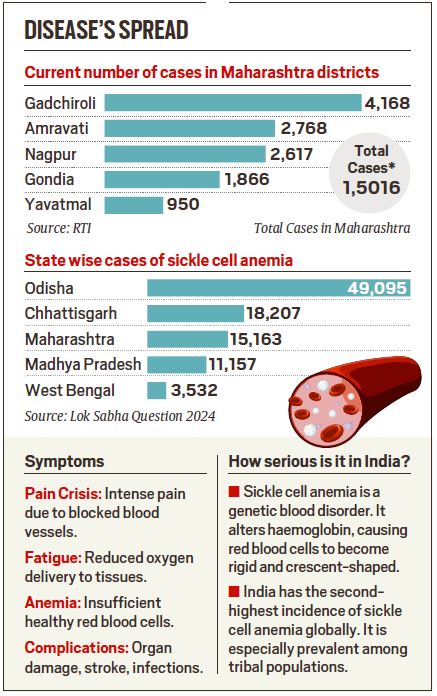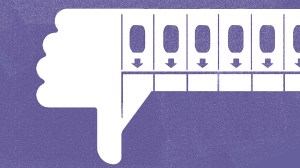Maharashtra struggles with high sickle cell anemia cases over insufficient health infra
It has the third highest number of patients of all states
 31-year-old Naresh Donode suffers from sickle cell anemia. He hails from Gondia, a district with a tribal population of 16.18 per cent as per the 2011 census.
31-year-old Naresh Donode suffers from sickle cell anemia. He hails from Gondia, a district with a tribal population of 16.18 per cent as per the 2011 census.Maharashtra, India’s wealthiest state, grapples with the challenge of being the third-highest in sickle cell anemia (SCA) cases, predominantly affecting the tribal population. Despite efforts to eliminate the disease by 2047, the state contends with insufficient health infrastructure. Across 26 districts where the blood disorder prevails, patients find themselves in dire need of treatment, facing the risk of deformities as well as it being a threat to their lives.
On Rare Disease Day, The Indian Express spoke with patients and doctors, stressing the need for enhanced health infrastructure to accomplish the National Sickle Cell Anemia Elimination Mission by 2047.
Manoj Ramkrishna Ramtake (31) from Gadchiroli living with the blood disorder, has developed hip joint osteonecrosis as a result of reduced blood flow and it has led to bone tissue damage and deterioration. His condition is so severe he is unable to walk and has to be carri. In the absence of an experienced orthopedic surgeon, he has been referred to Nagpur AIIMS for knee replacement surgery.
“My family has already spent over Rs 1 lakh on my treatment in private hospitals. Since I have been suffering from the disease since adolescence. I had to drop out of school due to the pain,” Manoj said.
This is not an isolated case. Patients with SCA facing organ failure and bone necrosis are consistently referred to distant, larger cities, reflecting the inadequate health infrastructure in rural areas. Patients and doctors have said this disparity persists in regions with the highest prevalence of the disorder.
 Manoj Ramtake had to quit school because of SCA
Manoj Ramtake had to quit school because of SCA
Dr Ramesh Katre, a senior doctor from Gadchiroli, instrumental in incorporating a chapter on sickle cell anemia in all higher educational institutions in India, emphasises that over 40 per cent of cases experience associated complications. Interruptions in treatment due to insufficient awareness and the availability of medicine contribute significantly to the challenges of SCA management.
SCA is a genetic blood disorder prevalent in India, resulting in abnormal hemoglobin, deformed red blood cells, pain, and complications. Being a rare disease, India has the second-highest incidence globally after Africa.
Surgical complications are elevated in SCD patients, presenting risks of acute chest syndrome, infections, and severe pain. Rural doctors lack training for such challenges.
“We lack haematologists for overseeing vital blood transfusions to enhance oxygen delivery, and there are no facilities for knee or hip replacement post bone necrosis from sickle cell anaemia,” Katre said.

Commenting on it, Dr Daval Salve, district health officer (DHO) refuted the need for haematologists in treating such patients. “Yes, we don’t have haematologists in government hospitals but the general doctors and surgeons are qualified enough to handle such cases,” he says.
This is despite the fact that Gadchiroli has the highest caseload with 4,168, as per information obtained through a Right to Information (RTI) application filed by The Indian Express. It is followed by Nagpur (2,617), Amravati (1861), Gondia (1398) and Yavatmal (950).
SCA inflicts damage on kidneys by creating blockages in blood vessels, resulting in reduced blood flow—the most prevalent side effect of this blood disorder. Unfortunately, in rural regions where nephrologists are scarce, patients face significant challenges. Take, for instance, the case of 31-year-old Naresh Donode from Gondia, a district with a tribal population of 16.18 per cent as per the 2011 census. Diagnosed with SCA in adolescence, he dedicated his life to the well-being of fellow patients.
 How sickle cell disease works.
How sickle cell disease works.
However, in 2022, he noticed swelling on his legs and face. Seeking medical help at the district hospital revealed the absence of specialists, leading to a referral to AIIMS, Nagpur. After undergoing tests there, he received the devastating diagnosis of kidney failure. He has spend over Rs 2 lakh till date on diagnosis and medical care.
Expressing his predicament, he said, “I have visited AIIMS Nagpur eight times for diagnosis and treatment, selling off my wife’s gold. Now, I have been asked to undergo dialysis, but with SCA, undergoing it in a government setup is challenging in the absence of a haematologist to monitor, given the vascular access challenges and higher infection risks.”
After an inquiry with the district civic surgeon Dr Mohabe, it was highlighted that severe cases necessitate referrals to higher tertiary care due to the absence of specialists in the region.
At present, the state contributes nearly 15 per cent to the national caseload. The Sickle Cell Anaemia Elimination program, initiated after its announcement in last year’s budget, reports a total of 102,021 cases in India. Maharashtra ranks third with 15,163 cases, following Odisha (49,095) and Chhattisgarh (18,207). Of the total cases in Maharashtra, 8,842 are female and 6,318 are male. Additionally, 90,000 individuals are asymptomatic carriers of the condition.
The state has screened over 32 lakh people in 26 districts and is set to initiate prenatal genetic testing. Typically performed between 15 and 20 weeks of pregnancy, amniocentesis collects amniotic fluid to analyse foetal cells for the presence of the sickle cell gene. “We have tied up with the Borivali bone marrow transplant centre (run by BMC) for the testing. Pregnant women with the disorder are taken to the centre free of cost for the test,” he said.
Gautam Dongre, Secretary of the National Alliance of Sickle Cell Organizations (NASCO) and a Member of the Sickle Cell Council in the Government of India questioned the initiative. He expressed concerns about the practicality. He stated that it would require pregnant women to travel hundreds of kilometres to reach Mumbai, a journey most tribal women would likely refuse.
“The Centre plans to eliminate the disease, ensuring no child is born with it. For this, they need to conduct genetic testing when a woman is pregnant in close proximity in areas with the most cases. However, significant centres like AIIMS in Nagpur lack the necessary facilities,” he said.
A patient with SCA requires a daily intake of 5mg of folic acid twice a day and one tablet of Hydroxyurea. Unfortunately, these essential medications are frequently unavailable, causing significant challenges for patients.
Dr Katre said, “Often, these medicines are not on the shelves. It becomes troublesome for patients to sacrifice their daily wages and stand in queues repeatedly to obtain the medications. As a result, they discontinue the treatment until their condition deteriorates.”
An issue outlined by a patient rights organisation is the unavailability of blood, which is life-saving for patients suffering from the disorder. Although the National Health Mission promises free blood transfusions for all sickle cell patients, the patients claim the ground reality is different.
“Such patients require blood transfusion in an emergency. But in the absence of blood banks in rural areas, the patient’s relatives are being forced to find replacement blood, which is just a waste in the golden hour of treatment,” said Dongre.
Dr Mohabe highlighted that severe cases necessitate referrals to higher tertiary care due to the absence of specialists in the region. He said, “Our sole nephrologist (in the district) who assisted in dialysis for sickle cell patients, has resigned. With no nephrologist, we’re actively seeking a contractual doctor from Nagpur to fill this crucial role.”
“The Centre plans to eliminate the disease, ensuring no child is born with it. For this, they need to conduct genetic testing when a woman is pregnant in close proximity to areas with the most cases. However, significant centres like AIIMS in Nagpur lack the necessary facilities,” he said. Echoing the same, Dr Mohabe said, “We have yet to initiate prenatal testing due to challenges in transporting pregnant mothers from Gondia to Borivali. We’ve requested the health department to establish this facility at AIIMS Nagpur.”












